

What It Means When Scientists Disagree. BAD PHYSICS: Misconceptions spread by K-6 Grade School Textbooks. The science myths that will not die. Was the forbidden fruit in the Garden of Eden an apple? – The Straight Dope. The apple’s many admirers like to portray it as a symbol of wholesomeness – apple cheeks, an apple for teacher, and so forth.

Don’t be deceived. This is a fruit with a history. Let’s review the story. Irregardless of its reputation, a word perseveres. American Journal of Physiology-Regulatory, Integrative and Comparative Physiology. Obesity Metaphors: How Beliefs about the Causes of Obesity Affect Support for Public Policy. Is Iceland Really Green and Greenland Really Icy? A longstanding rumor claims the names are a bait and switch.
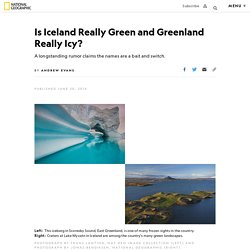
A glance at the globe might make you wonder why Iceland seems oddly green, while Greenland is covered in ice. There’s even an Internet meme about it. Schoolyard wisdom says this was intentional—Iceland’s Viking settlers thought the name would discourage oversettlement of their verdant island, while nobody cared if people tried to settle the ice-covered Greenland. But the truth is more complicated, and it has to do with both Norse custom and our shifting global climate. Busting a myth about Columbus and a flat Earth. Einstein Failed School › Dr Karl's Great Moments In Science (ABC Science) News in Science.
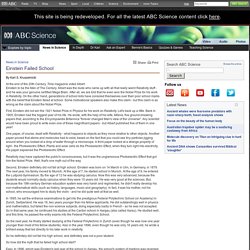
Lots of people claim to have a photographic memory, but nobody actually does. No end to the battery storage debate. Schizophreniasymptoms.com - Dispelling the Myths. Schizophrenia affects millions of Americans, but the illness and its causes are often misunderstood.

Here, we dispel the disease’s most common myths. Quality Health News. 50 Great Myths of Popular Psychology: Shattering Widespread Misconceptions ... - Scott O. Lilienfeld, Steven Jay Lynn, John Ruscio, Barry L. Beyerstein. What It Means When Scientists Disagree. Fake News Comes to Academia. Individual Knowledge in the Internet Age. © 2010 Larry Sanger.
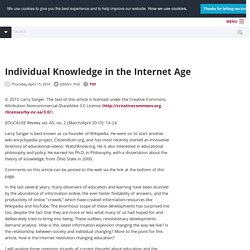
The text of this article is licensed under the Creative Commons Attribution-Noncommercial-ShareAlike 3.0 License ( EDUCAUSE Review, vol. 45, no. 2 (March/April 2010): 14-24 Larry Sanger is best known as co-founder of Wikipedia. He went on to start another wiki encyclopedia project, Citizendium.org, and has most recently started an innovative directory of educational videos: WatchKnow.org. He is also interested in educational philosophy and policy. Teamwork Wins! Why Science Is Not an Individual Sport. – Sustainable Nano. How Scientists Still Work Together, Even When Their Countries Don’t. Working together doesn’t always work. The benefits of working together are so widely recognized that they’re cliché.
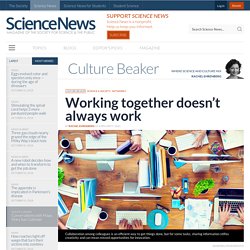
Two heads are better than one. Many hands make light work. Across All Fields, International Collaborations Is How Science Gets Done – Futurism. The Pros and Cons of Team Science in Laboratory Research. How biased is science? What Are The Signs Of Biased Science Papers? In theory, science should be entirely free of bias.

That's never true, but we can still strive to minimize distortions. Yet to do that effectively, it helps to know how much there is at the moment. A paper in Proceedings of the National Academy of Sciences attempts to measure certain types of scientific bias and to reveal which fields are the worst. Scientific bias can operate in many ways. How scientists fool themselves – and how they can stop. Illustration by Dale Edwin Murray In 2013, five years after he co-authored a paper showing that Democratic candidates in the United States could get more votes by moving slightly to the right on economic policy1, Andrew Gelman, a statistician at Columbia University in New York City, was chagrined to learn of an error in the data analysis.

In trying to replicate the work, an undergraduate student named Yang Yang Hu had discovered that Gelman had got the sign wrong on one of the variables. Gelman immediately published a three-sentence correction, declaring that everything in the paper's crucial section should be considered wrong until proved otherwise. The Myth of Disinterested Science. Finally, Economists Acknowledge That They're Biased.
Every economist I follow has been tweeting or retweeting this Times op-ed by renowned economist and blogger Tyler Cowen which argues convincingly that while economic analysis is value-free, most economists are not.
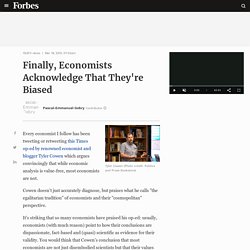
Cowen doesn't just accurately diagnose, but praises what he calls "the egalitarian tradition" of economists and their "cosmopolitan" perspective. It's striking that so many economists have praised his op-ed: usually, economists (with much reason) point to how their conclusions are dispassionate, fact-based and (quasi) scientific as evidence for their validity.
Are Your Ideas Really That Good? Beware the IKEA Effect - Experiential Marketing Blogs - Freeman XP. How Many Psychology Studies Are Wrong? In the wake of several scandals in psychology research, scientists are asking themselves just how much of their research is valid.
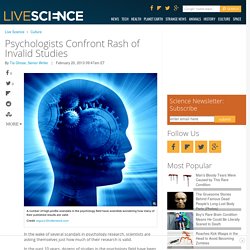
In the past 10 years, dozens of studies in the psychology field have been retracted, and several high-profile studies have not stood up to scrutiny when outside researchers tried to replicate the research. By selectively excluding study subjects or amending the experimental procedure after designing the study, researchers in the field may be subtly biasing studies to get more positive findings. And once research results are published, journals have little incentive to publish replication studies, which try to check the results.
Scientific Proof Is A Myth. You've heard of our greatest scientific theories: the theory of evolution, the Big Bang theory, the theory of gravity. You've also heard of the concept of a proof, and the claims that certain pieces of evidence prove the validities of these theories. Fossils, genetic inheritance, and DNA prove the theory of evolution. The Hubble expansion of the Universe, the evolution of stars, galaxies, and heavy elements, and the existence of the cosmic microwave background prove the Big Bang theory. And falling objects, GPS clocks, planetary motion, and the deflection of starlight prove the theory of gravity. Except that's a complete lie. Historical Methodology: Evidence and Interpretation. Preview UsingHistoricalEvidence.
Art as evidence. A guide to evidence based art. Where’s the evidence? A scientist’s struggle with religion. The recent visit of Pope Francis to Ireland, following so soon after the discovery of yet more horrific crimes committed by Catholic clergy against children, prompts reflection the thorny relation between religion and science. How should a scientist react to the pope’s visit? One answer is that scientists’ views of organised religion are as diverse as those of any other section of the population. While some well-known scientists take a decidedly critical view of the great religions of the world, others profess deeply held beliefs.
Indeed, I have often heard prominent scientists describe how they reconcile profound religious faith with their science at the Faraday Institute for Science and Religion at the University of Cambridge. That said, I don’t always find such presentations convincing – my own view is that science and religion make strange bedfellows. Self-correction v tradition.